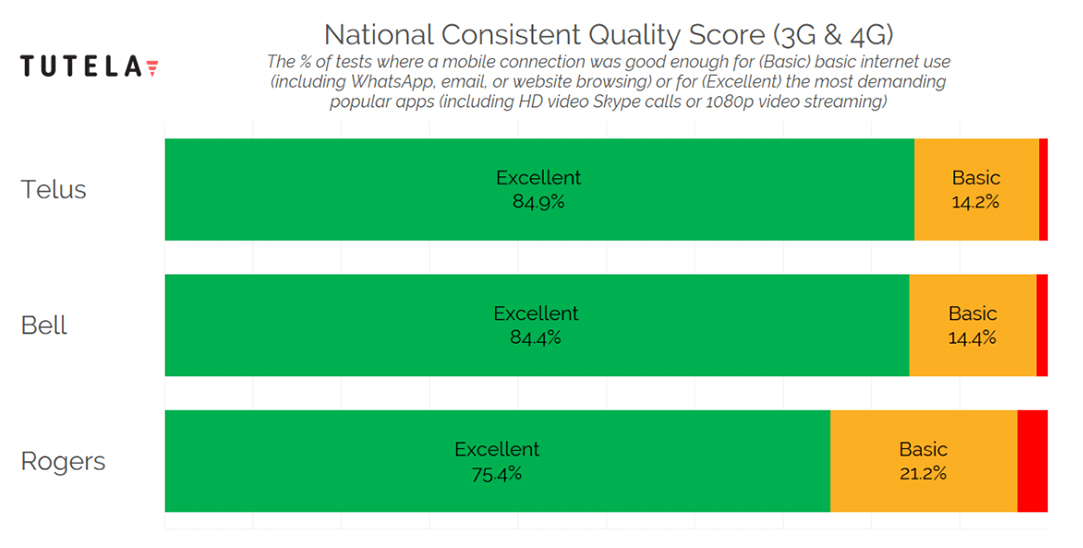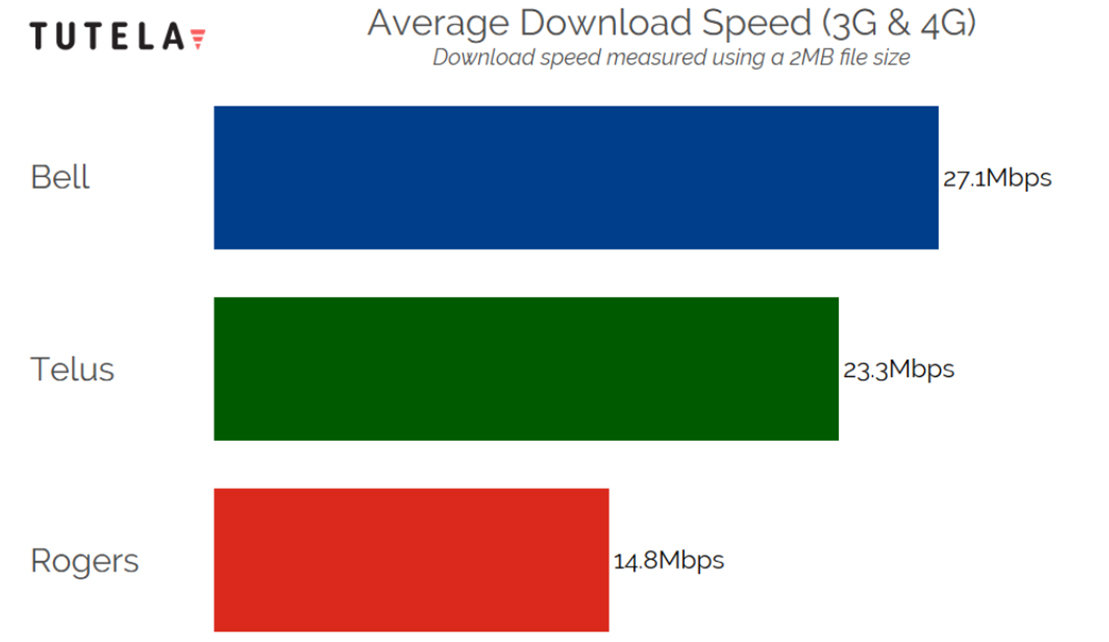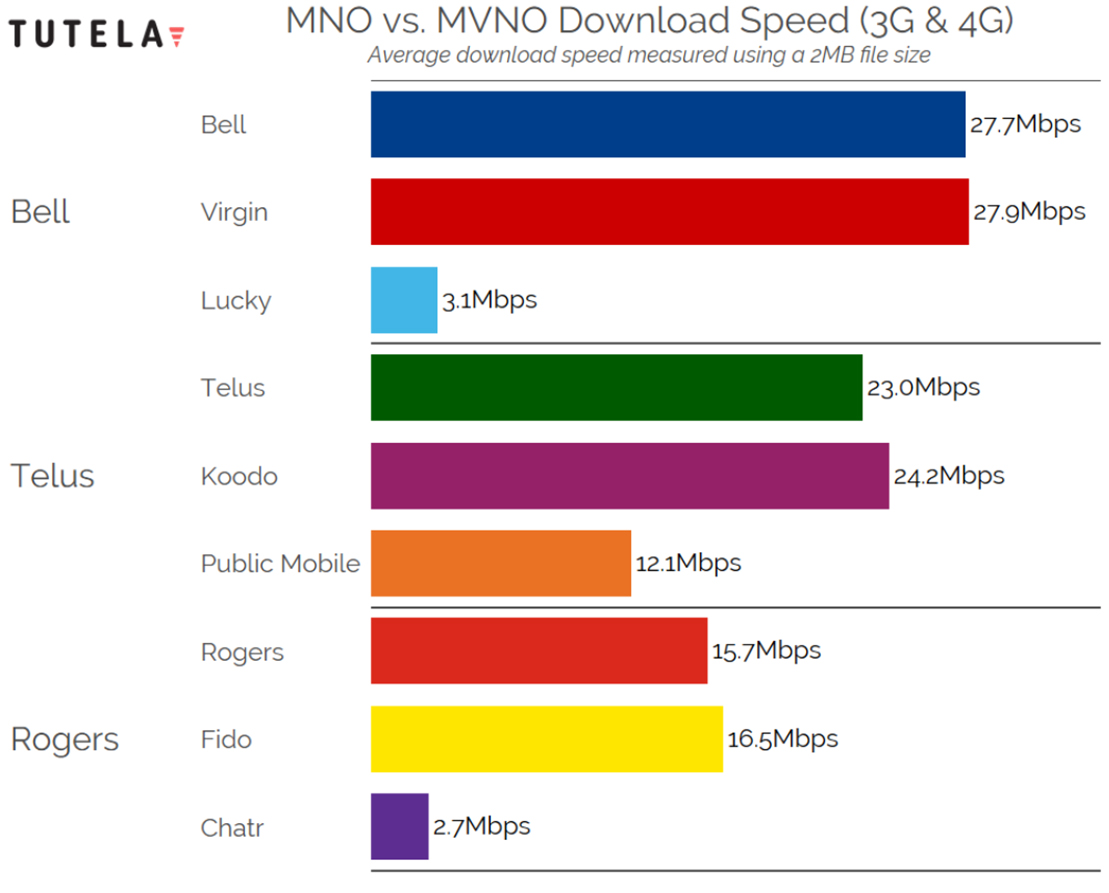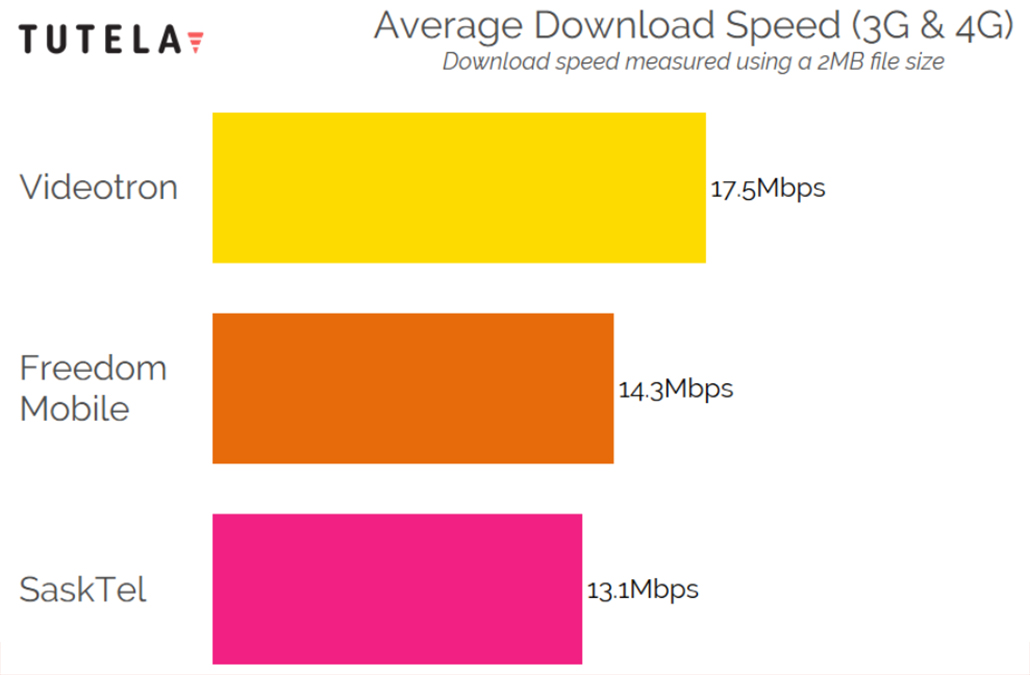Bell, Telus offer most consistent network quality in Canada: Tutela report
Victoria-based mobile information company Tutela released its March 2019 'State of Mobile Networks' study for Canada, which reveals some surprising details about Canadian telecom services and confirms some things nosotros already know.
Right off the bat, the report notes that Canadians pay the "highest toll in the developed world for their LTE data." While that might not exist a surprise to most, the written report goes on to say that Canadians benefit from "reliable, high-speed" coast-to-coast coverage.
Tutela's report focuses primarily on the consistency and quality of each carrier's networks. One of the metrics used to determine the quality is download speed, only the report stresses that high speed isn't the exist all and end all. The quality measures also consider upload speed, latency, jitter and packet loss when assessing quality.
What does it hateful to have consequent quality?
Tutela adult a 'consistent quality standard' it uses to measure the carriers.
In its simplest form, the standard groups networks in two quality pockets: 'Basic' and 'Excellent.'
According to Tutela, networks that have an boilerplate download speed at or above 4Mbps, upload speed at or higher up 2Mbps, latency at or higher up 50ms, jitter at or in a higher place 30ms and around zero percent packet loss autumn into the Excellent pocket.
Excellent networks are sufficient for the nearly demanding apply cases, according to the visitor. That ways users can reliably stream 1080p video, perform video calls and more.
Tutela says basic is enough for simple spider web browsing, emails and VOIP calling. However, users who endeavor to do more volition probable experience delays and buffering.
Y'all can learn more well-nigh how Tutela measures network quality here.
Bong and Telus accept virtually consistent quality

Tutela applied its standards to Canadian telecoms' 4G and 3G networks to determine which offered the most consistent quality. The company started with the Big Three: Rogers, Bell and Telus.
According to the study, Bell and Telus had a virtual tie in network quality despite Bong's superior download and upload speeds.
Tests of Telus' network roughshod into the Excellent category 84.ix pct of the time compared to Bell'southward 84.iv percent. Across Canada, Rogers' Excellent consistent quality score was nine percent lower than the other two.
In almost a quarter of tests, Rogers' network did not encounter Tutela'south standard for Excellent consistent quality.
Tutela also compared the provinces to run across which telecoms had the all-time quality in different geographic areas. B.C., Alberta, Ontario, Quebec and New Brunswick all saw at to the lowest degree 2 providers tied for quality.
Rogers had the all-time network quality in Saskatchewan, Bong in Nova Scotia and P.Eastward.I. and Telus in Manitoba and Newfoundland and Labrador.
Additionally, Tutela's data shows that every province except Manitoba has a network quality rating of lxxx percentage or higher. Manitoba measures in at 74 percent.
Tutela'due south report did not measure data from the territories.

As for download speeds, Bell clocked in with an average 27.1Mbps average on its 3G and 4G networks, making information technology the fastest.
Telus was 2d with an average download speed of 23.3Mbps.
Rogers came 3rd with 14.8Mbps download speed.
Upload speeds saw a similar blueprint, simply the gap was much closer. Bell saw an average of 11.4Mbps on its 3G and 4G networks, Telus saw 11Mbps and Rogers had nine.8Mbps.
Tutela also measured network latency beyond the Big Three. Telus scored the all-time here with 36.8ms boilerplate latency compared to Bell's 37.7ms and Rogers' 46.9ms latency.
Flanker brands: just every bit practiced, or much worse
The report too measured the performance of the Big Three'due south flanker brands. Bong owns Virgin Mobile and Lucky Mobile, Telus owns Koodo and Public Mobile and Rogers owns Fido and Chatr.
Co-ordinate to the report, Virgin, Koodo and Fido all offer nigh identical or better download speeds than their parent carriers. Public, Lucky and Chatr all offer significantly worse download speeds — although it's worth noting that Public is nonetheless nigh 9Mbps faster than Chatr and Lucky.

Tutela says the reason why Virgin, Koodo and Fido saw slightly college download speeds than the Big Three is because of demographic differences. The subscribers to these flanker brands are more likely to live in urban areas, where download speeds are higher on average.
Every bit for Lucky, Public and Chatr, Tutela notes that all iii predominantly offer plans restricted to 3G data in substitution for reduced monthly costs. The company says 3G caps out at 3Mbps download speed, which isn't loftier enough to authorize for the Excellent consistent quality standard.
Regional operators keep step
Tutela measured the quality of regional telecom operators Videotron, Liberty and SaskTel also.
These carriers offer a cheaper alternative to the Large 3 but are restricted to specific regions. Users tin 'roam' on the national carriers when they leave the coverage region, merely with limits.
All iii comprehend major urban areas in their regions. Videotron covers a large portion of southern Quebec effectually Ottawa and upwards the Saint Lawrence River. SaskTel covers most of the lesser half of Saskatchewan and Liberty has service in large metro areas similar Toronto, Vancouver and Edmonton.

Tutela institute the regional operators typically kept step in terms of speed and coverage quality.
Videotron measured an Excellent consistent quality rating of 87.iv percent. SaskTel came in at 81.4 percent and Freedom at 72.9 percent.
Videotron also topped the charts for boilerplate download speed at 17.5Mbps across its 3G and 4G networks, followed by Freedom at 14.3Mbps and SaskTel at 13.1Mbps.
How Tutela measures the data
Tutela measures network data through more iii,000 popular iOS and Android apps and games. The company pays those apps and games to host the software.
Users with these apps are asked if they want to let Tutela to perform tests.
Tutela performs download and upload speed tests if a users consents, typically with a smaller 2MB files for downloads and 1MB for uploads. Tutela says this kind of testing more than accurately represents a network's speed as information technology measures several small downloads and uploads over time.
This straight contrasts other speed measurements similar Speedtest and Ookla, which use a single, larger download file for testing.
To learn more than virtually Tutela'due south data measurement, check out this MobileSyrup article, which features an in-depth explainer from the company almost its process.
Yous can read Tutela's State of Mobile Networks report for yourself hither.
Source: https://mobilesyrup.com/2019/03/16/bell-telus-consistent-network-quality-canada-tutela/
Posted by: clarkancentim.blogspot.com


0 Response to "Bell, Telus offer most consistent network quality in Canada: Tutela report"
Post a Comment